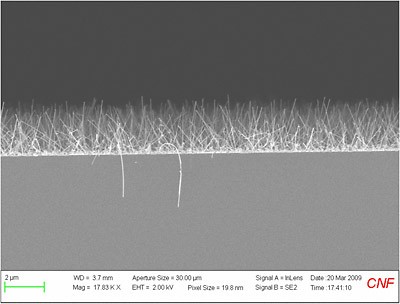Sustainability grants to explore burning powdered wood, developing cheaper solar cells and more
By Krishna Ramanujan
Assessing how green energy projects could impact rural communities, developing an efficient and clean method to burn powdered wood and creating low-cost, low-energy solar cells using grasslike silicon nanowires are three of five projects that the Cornell Center for a Sustainable Future (CCSF) will fund this year to stimulate original and cross-disciplinary work in sustainability science.
The CCSF, founded in 2007, awarded more than $500,000 May 19 in the second year of its Academic Venture Fund competition. These projects were selected for their ability to foster interdisciplinary sustainability innovation at Cornell and their potential to involve external partners in industry, government, foundations and nongovernmental organizations.
"The interdisciplinary nature of these proposals was impressive," said Frank DiSalvo, the J.A. Newman Professor of Chemistry and Chemical Biology and CCSF director. "Ninety percent of the proposals were cross-departmental, and over three-quarters of the submissions included investigators from more than one college or school at Cornell. It was very difficult to winnow the 26 proposals that were submitted this year down to the five projects we selected."
The five research projects are:
- Sustainability of food systems: Researchers will assess the sustainability of such food systems as farming practices, transportation, processing and storage, food consumption and disposal of wastes. The team will develop a method to compare the ecological footprints of local food systems with conventional practices that require shipping but provide cheap food year-round.
- Assessing net carbon emissions in agricultural regions: A significant barrier to applying national and international initiatives to agricultural carbon emissions has been a lack of viable methods for assessing those emissions. To counter this knowledge gap, the research team will use comprehensive soil and plant samples and data on land use, topography and water use, and will refine protocols and statistical tools to develop methods for assessing agricultural carbon emissions, sequestration and storage. Researchers will conduct field studies in New York state and Zambia.
- The impact of green-energy development on rural community sustainability: While green-energy projects promise substantial benefits, they may carry such risks for rural communities as stressed municipal services, land use changes, greater economic inequality and a "boom/bust" cycle of economic development. This study will evaluate the sustainability of rural communities in the face of a large-scale restructuring of the nation's energy supply.
- Micropowdered biomass combustion as a sustainable energy source: Instead of converting solid biomass to liquid fuel and losing much of each plant's available energy, this project seeks to develop an efficient method to burn plants that have been ground into powders to generate heat. This clean-combustion technology offers a fully local, sustainable energy solution that does not require cropland or fertilizer. The research group will seek industry partners to produce test installations at Cornell.
- A solar cell that uses inorganic "grass": This project promises a low-cost, low-energy technique for creating silicon solar cells. The process -- developed at Cornell -- involves replacing expensive single-crystal silicon wafers with grasslike silicon nanowires. The new technology could one day provide a much cheaper alternative to solar cells now on the market.
The research projects are intended to demonstrate proof of principle, provide insights and tools for addressing needs or establishing new and innovative ideas and approaches to specific sustainability problems.
Get Cornell news delivered right to your inbox.
Subscribe